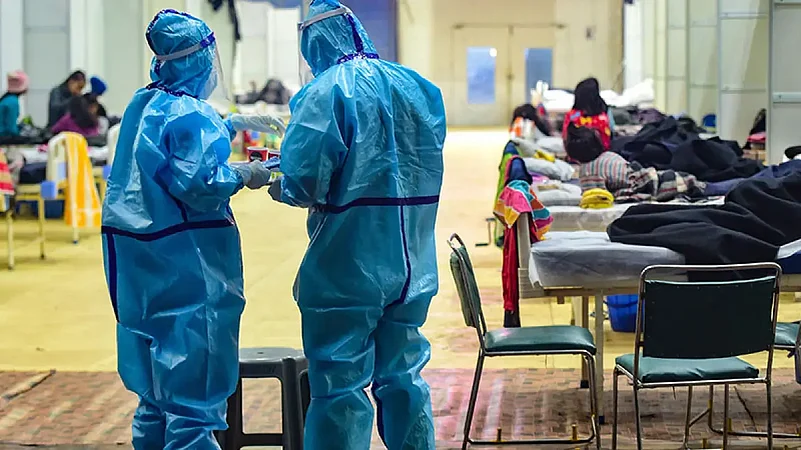From creating specialised isolation rooms to ensuring nearly contactless conveying of blood and other samples to a centralised laboratory, several Covid-safety design elements have been incorporated in the just-inaugurated Amrita Hospital here after "learning lessons" from the pandemic that heavily stalled the project.
The state-of-the-art hospital built in a 130-acre campus was envisioned in 2012, eight years before the outbreak of the COVID-19 pandemic in India. Work began on it in 2016, and the 2,600-bed hospital complex, built under the auspices of Mata Amritanandmayi Math, was inaugurated by Prime Minister Narendra Modi on Wednesday.
According to Dr Sanjeev K Singh, Resident Medical Director of the hospital, the initial plan was to site it in Delhi, and many places were scouted in the national capital, from Dwarka in western part of the city to Shahdara in trans-Yamuna area, and even Gurgaon and greater Gurgaon, but eventually it was decided to build it in Faridabad.
"The groundwork for the project had started on a plot of land in mid-2016 and simultaneously negotiations began with more farmers, parallelly also with a group of architects for the design of the complex with sustainability in mind," he told PTI.
The project was planned to be completed and opened by September 2019, but the timelines got delayed due to multiple factors like acquisition of farm lands and litigation, and it was "heavily stalled" during the lockdowns due to the Covid pandemic, as workers after some time had left for their home towns.
"However, Covid also taught us valuable lessons, and some of the designs were redrawn and certain elements were incorporated to make the hospital environment safer for people as Covid infection is now being assumed to spread largely through droplets or air. So, we have built something called a negative pressure room - a kind of an isolation room in which suspected cases can be kept away from others. This is different from a regular isolation room," he said.
In such rooms, the air pressure inside the room is lower than that outside it and non-contaminated filtered air can flow into the negative pressure room, while contaminated air is sucked out of the room with exhaust systems, which are built with filters that clean the air before it is pumped out and away from a healthcare facility, the doctor explained.
"Besides, our system attempts to make the process as contactless as possible. So, every doctor will have a dedicated digital tablet, meaning it can't be shared with others, and which will have all the details and history of patients. This step is also in line with the vision of sustainability in the project to make it as paperless as possible," he added.
Amrita Hospital is the second hospital built under the aegis of the Mata Amritanandmayi Math in the country. The first one was set up in Kochi in 1998. The new mega hospital in Faridabad's Sector 88 near Delhi-Mathura Road has a built-up area of one crore sq ft, and the campus will also have a medical college, which would become functional once certain mandatory approvals from the competent authority is granted, its officials said.
The sprawling campus also has a dedicated research block and eight centres of excellence -- gastro sciences, renal sciences, bone diseases and trauma, transplants, and mother and child care. The hospital buildings will span 36 lakh sq ft in built-up area, with a 14-floor tower housing key medical facilities. There is also a helipad facility on the rooftop, they said.
The 2,600-bed new private hospital is equipped with cutting-edge technology, including a centralised fully automated laboratory, and patient-centric wards and OPDs. The new super speciality hospital has been opened with 500 beds at present, and is expected to be fully operational in a phase-wise manner in the course of the next five years. The hospital with 81 specialities, once fully operational, is billed to be the largest private hospital in Delhi-NCR and the country, the officials said.
"In terms of cutting-edge technology being introduced as also to make the system more patient-centric, from each room in critical care or other wards, blood or other samples can be taken within the room only, and then the vial can be sent to the centralised lab using pneumatic tubes, with no human interference. That way, the scope of contact also gets reduced," Singh said, adding, this also will also significantly cut down manpower requirements such as staff needed to ferry samples to the lab.
Each vial has a bar code, and once the vial reaches the collection room and is manually moved to the lab system, it is sent to the designated machine automatically guided by the bar code, whether it is for serum or plasma extraction or blood test, etc. It is a massive automated system and assumes greater significance in terms of Covid safety, he said.
(With PTI inputs)


























